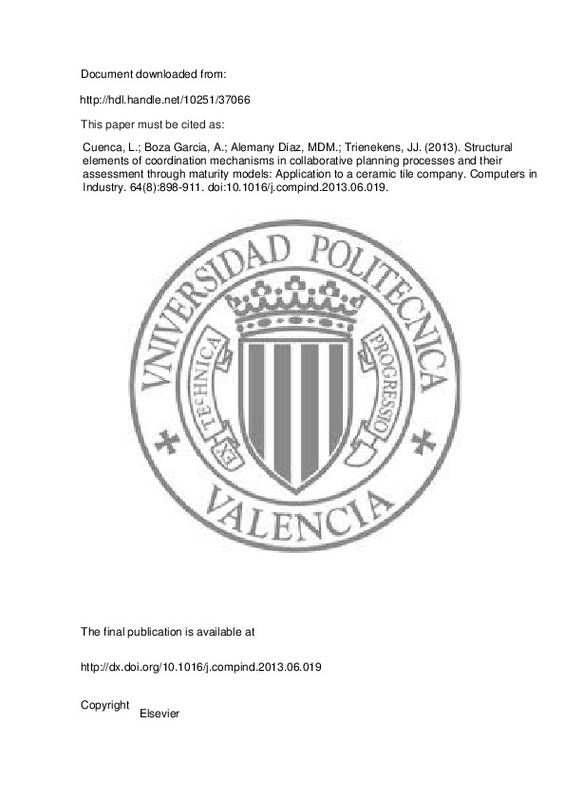JavaScript is disabled for your browser. Some features of this site may not work without it.
Buscar en RiuNet
Listar
Mi cuenta
Estadísticas
Ayuda RiuNet
Admin. UPV
Structural elements of coordination mechanisms in collaborative planning processes and their assessment through maturity models: Application to a ceramic tile company
Mostrar el registro sencillo del ítem
Ficheros en el ítem
| dc.contributor.author | Cuenca, L.
|
es_ES |
| dc.contributor.author | Boza García, Andrés
|
es_ES |
| dc.contributor.author | Alemany Díaz, María del Mar
|
es_ES |
| dc.contributor.author | Trienekens, Jos J.M.
|
es_ES |
| dc.date.accessioned | 2014-04-17T14:43:38Z | |
| dc.date.issued | 2013-10 | |
| dc.identifier.issn | 0166-3615 | |
| dc.identifier.uri | http://hdl.handle.net/10251/37066 | |
| dc.description.abstract | Maturity is defined as a measure to evaluate the capabilities of an organization in regards to a certain discipline. The Collaborative Planning Process is a very complex process and Coordination mechanisms are especially relevant in this field to align the plans of the supply chain members. The objective of this paper is to develop a maturity model and a methodology to perform assessment for the Structural Elements of Coordination Mechanisms in the Collaborative Planning Process. Structural elements are specified in order to characterize coordination mechanisms in a collaborative planning context and they have been defined as key areas to be assessed by the maturity model. The identified structural elements are: number of decision-makers, collaboration level, interdependence relationships nature, interdepen-dence relationships type, number of coordination mechanisms, information exchanged, information processing, decision sequence characteristics and stopping criteria. Structural elements are assessed using the scheme of five levels: Initial, Repeatable, Defined, Managed and Optimized. This proposal has been applied to a ceramic tile company and the results are also reported. | es_ES |
| dc.language | Inglés | es_ES |
| dc.publisher | Elsevier | es_ES |
| dc.relation.ispartof | Computers in Industry | es_ES |
| dc.rights | Reserva de todos los derechos | es_ES |
| dc.subject | Maturity model | es_ES |
| dc.subject | Collaborative planning | es_ES |
| dc.subject | Structural elements of coordination mechanisms | es_ES |
| dc.subject.classification | ORGANIZACION DE EMPRESAS | es_ES |
| dc.title | Structural elements of coordination mechanisms in collaborative planning processes and their assessment through maturity models: Application to a ceramic tile company | es_ES |
| dc.type | Artículo | es_ES |
| dc.identifier.doi | 10.1016/j.compind.2013.06.019 | |
| dc.rights.accessRights | Abierto | es_ES |
| dc.contributor.affiliation | Universitat Politècnica de València. Departamento de Organización de Empresas - Departament d'Organització d'Empreses | es_ES |
| dc.description.bibliographicCitation | Cuenca, L.; Boza Garcia, A.; Alemany Díaz, MDM.; Trienekens, JJ. (2013). Structural elements of coordination mechanisms in collaborative planning processes and their assessment through maturity models: Application to a ceramic tile company. Computers in Industry. 64(8):898-911. doi:10.1016/j.compind.2013.06.019 | es_ES |
| dc.description.accrualMethod | S | es_ES |
| dc.relation.publisherversion | http://dx.doi.org/10.1016/j.compind.2013.06.019 | es_ES |
| dc.description.upvformatpinicio | 898 | es_ES |
| dc.description.upvformatpfin | 911 | es_ES |
| dc.type.version | info:eu-repo/semantics/publishedVersion | es_ES |
| dc.description.volume | 64 | es_ES |
| dc.description.issue | 8 | es_ES |
| dc.relation.senia | 248367 |







![[Cerrado]](/themes/UPV/images/candado.png)

